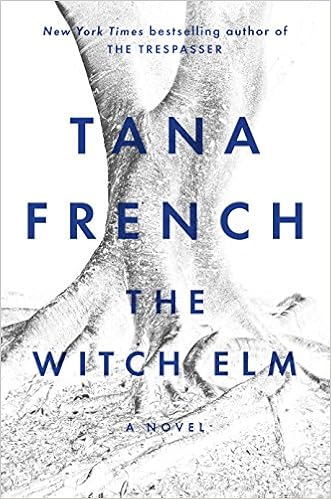3 Stars
 I was
planning on reading the first book in the Dublin Murder Squad series since I’ve
read so many positive reviews of it, but then I noticed that a standalone novel
by the author was released earlier this fall.
I don’t know how The Witch Elm
compares to the series, but I’m afraid the book doesn’t motivate me to read
another Tana French novel.
I was
planning on reading the first book in the Dublin Murder Squad series since I’ve
read so many positive reviews of it, but then I noticed that a standalone novel
by the author was released earlier this fall.
I don’t know how The Witch Elm
compares to the series, but I’m afraid the book doesn’t motivate me to read
another Tana French novel.
Toby
Hennessy, as he states in the opening sentence, is a lucky person. He is
good looking, smart, athletic, and popular.
He has a good job, supportive parents, a close-knit extended family,
stalwart friends, and a devoted girlfriend. He has no real financial worries: he seems to
have considerable savings and his parents put down the deposit when he
purchased his apartment. Toby suspects his
cousin Leon thinks of him as “some pampered prince who had never dealt with anything
tougher than a hangover” because even as a boy, “[Toby] never worried about
getting in trouble – [he] always talked [his] way out of it.”
Toby’s good
fortune comes to an end when he is brutally beaten in a home invasion. As a result of the attack, he walks with a
limp, slurs his speech, and has gaps in his memory. In many ways, he looks like a stroke victim. He also loses his confidence: “Me, six months ago, clear-eyed and
clear-voiced, sitting up straight and smart, answering every question promptly
and directly and with total unthinking confidence: every cell of me had carried
a natural and absolute credibility . . . Me now, slurring, babbling,
droopy-eyed and drag-footed, jumping and trembling . . . defective, unreliable,
lacking any credibility or authority or weight.”
Toby moves
in with his Uncle Hugo who has been diagnosed with terminal cancer. While Toby is living at Ivy House, a body is
discovered on the property and a murder investigation begins. Because of his memory lapses, Toby starts to
wonder if he may have played a role in the death.
One problem
I had with the book is its glacial pacing.
For pages and pages and chapters and chapters, nothing happens. The discovery of the body, for example, doesn’t
occur until page 162! The pace occasionally
picks up but then the plot becomes static again. There are no real twists and turns, no real surprises. Much of the novel consists of Toby’s
speculations as his paranoia mounts.
Another
problem is that Toby is not a likeable character. Before his trauma, he is judgmental and
dismissive of others’ concerns. When
discussing disadvantaged youth, whom Toby describes as “scuzzy youths with low-grade
criminal records,” he has little sympathy:
“’The recession’s over; there’s no reason for anyone to be stuck in the muck
unless they actually choose to be.’”
When a friend with a less-privileged background tells Toby, “’You haven’t
got a clue’”, Toby thinks his friend “liked to play up the
wrong-side-of-the-tracks angle, when he wanted an excuse to get chippy and
self-righteous.”
Even after
his trauma, Toby does not become much more likeable. He devotes a lot of time to complaining about
the effects of the beating but does nothing to help himself. He has no physiotherapy, speech therapy, or occupational
therapy appointments during his extended stay at Ivy House. His brain injury becomes a convenient excuse
for violent behaviour sparked by a bruised ego.
He speaks about having learned about luck but by the time he explains
his epiphany at the end, I didn’t care.
My other
issue with the novel is two characters.
Toby’s girlfriend Melissa and his uncle Hugo are just too good to be
true. Since Toby is the narrator, we see
the characters only from his point of view, but there is no evidence to suggest
that they are less than saints. And why
would Melissa be so slavishly devoted to a self-absorbed Toby who shows little
concern for anything outside his bubble of privilege?
This was a
disappointing introduction to Tana French.
I appreciate that she does shed light on the devastating effects of brain
injury. Unfortunately, the book’s
negative qualities outweigh the positive.
No comments:
Post a Comment